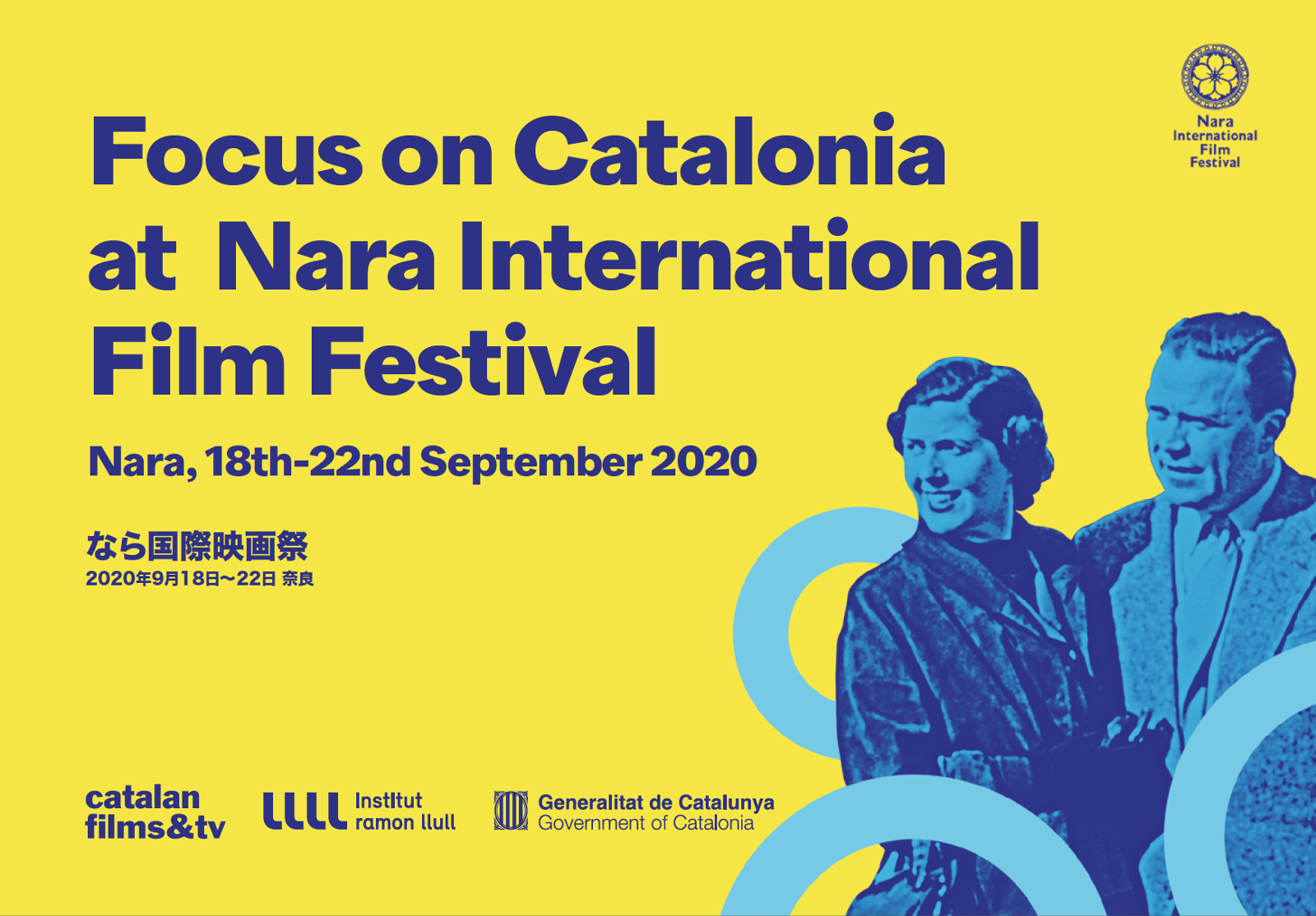It will take place in the Japanese city of Nara between 18 and 22 September and be curated by Lluís Miñarro. The filmmakers featured are Belén Funes, Lucía Alemany, Núria Giménez, Marta Bayarri, Ànnia Gabarró, Diana Toucedo, Meritxell Colell and Lucía Vas
This year, Nara International Film Festival (NIFF) will put Catalan cinema made by women in the spotlight. The event has scheduled five feature-length films directed by women: A Thief’s Daughter by Belén Funes (Oberon Cinematogràfica, BTeams Prods); The Innocence by Lucía Alemany (Un Capricho de Producciones, Turanga Films, Lagarto Films); The Perseids by Alberto Dexeus and Ànnia Gabarró (Boogaloo Films, Universitat Pompeu Fabra i Televisió de Catalunya); Transoceánicas by Meritxell Colell and Lucía Vassallo (Intropía Media, Paraiso Production, Pensilvania Films), the film makes its world premiere; and Thirty Souls by Diana Toucedo (Diana Toucedo Films, Lasoga Films). There will also be screenings of a short film, Vaca by Marta Bayarri (Momotrup Films), and a sixth feature-length film as part of the international competition: My Mexican Bretzel by Núria Giménez (Bretzel & Tequila, Avalon).
The spotlight highlights some of the new names in an eminently female generation of filmmakers that has recently seen success from Carla Simón, Laura Ferrés, Elena Trapé, Mar Coll, Elena Martín, Roser Aguilar, Neus Ballús, Celia Rico, and many more. With a unique added dimension: as well as directors and scriptwriters, this new generation is accompanied by young producers, including Belén Sánchez (Un Capricho Producciones); Serrana Torres (Intropía Media); Marta Ramírez (Coming Soon); Mireia Graell (Ringo Media) and Patricia Franquesa (Gadea Films).
The Institut Ramon Llull and Catalan Films &TV, the brand created by the Catalan Institute of Cultural Companies (ICEC) to promote Catalan audiovisual production abroad, aim to export the quality of new Catalan cinema through seven proposals, with women as the creative and artistic driving force. This activity is part of the governmental agreement between Catalonia and Japan which covers commercial links, education, culture, tourism, cuisine, new technologies and other spheres.
Narrative, intimate cinema
Directed by prominent filmmaker Naomi Kawase, Nara International Film Festival is one of the most renowned festivals in Japan and was created with a view to offering visibility for new generations of filmmakers from all over the world. The first edition of the biennial event took place in 2010. A monetary prize is awarded at the festival for the purpose of shooting a film in Nara, under the supervision of Kawase herself.
On the initiative of the Institut Ramon Llull and in collaboration with Catalan Films &TV, this edition is designed to draw attention to cinema made by young Catalans and to present this new generation of filmmakers, known as the Catalan New Wave, with a focus on cinema directed by women. Over recent years, this latter variable has become a decisive factor in the renovation of Catalan cinema in Catalonia. This is a generation that has developed in a time of economic and political fog, has trained in centres that focus on excellence, and is now presenting cinema that speaks from the perspective of the everyday and of the intimate, sometimes with sadness, other times with irony and humour. Narrative, intimate cinema that develops in the different spheres of audiovisual expression (experimental, fiction, documentary, etc.) with rich, diverse, transformative results.
Naomi Kawase, the event director
Naomi Kawase, born in the city of Nara itself, has had a dazzling career, with films that have won awards at festivals like Cannes, Locarno and San Sebastián. The Carrosse d’Or Prize, awarded to her at Cannes by the Society of French Directors (SRF) in 2009, named her the director most able to ‘explore the interstices of the intimate world’. This career award is added to all the international recognition she has accumulated since she graduated from Osaka Photography School in 1989: The Caméra d’Or for the film Suzaku (Cannes 1997, making her the youngest woman filmmaker to win an award in the festival’s history); Honourable Mention at Visions du Réel 1999 for The Weald (1997); an award at Locarno for Firefly (2000); and the jury’s Grand Prix at the 60th edition of the Cannes Film Festival for the must-see The Mourning Forest (2007).
In 2010, she presented the documentary Genpin at San Sebastián International Film Festival. This reflection on natural birth and the relationship between pleasure, childbirth and death was awarded the FIPRESCI Prize. Her status as one of the biggest figures in Japanese cinema was clear in the following years, with films like In Between Days, Still the Water, Sweet Bean, Radiance and Vision, among others. She and director Isaki Lacuesta created the Filmed Correspondence produced by the CCCB and presented last 23 November at the Pompidou Centre, with the collaboration of the Institut Ramon Llull.
Lluís Miñarro, curator of the Catalan spotlight
Lluís Miñarro’s long career producing and directing films has given rise to around forty films and over 120 awards from the most prestigious festivals, including the Palme d’Or at Cannes in 2010 for Uncle Boonmee Who Can Recall His Past Lives (Apichatpong Weerasethakul, Thailand). He has collaborated with filmmakers like Manoel de Oliveira, Albert Serra, Lisandro Alonso, Naomi Kawase and José Luis Guerín. Last year, his production company Eddie Saeta celebrated its 30th anniversary. Miñarro has just been awarded with the Pepón Coromina Prize 2020 from the Catalan Film Academy.
His work as a director features highlights such as Familystrip (2009), Blow Horn (2009) and the fictional feature films Stella Cadente (2014) and Love Me Not (2019). As a jury member, he has been invited to Locarno, Nara, San Sebastián, Buenos Aires, Munich and Karlovy Vary, and his films have been the object of retrospectives in Paris, Beijing, Montevideo, Genoa, Mexico City, Barcelona i Madrid.
PROGRAMME (Japan time)
Due to the outbreak of, the festival offers an hybrid format and the audience will wnjoy both live and digital screening. Check the progran following this link.
19 September
- 5 p.m. - Bus Terminal Lecture Hall: A Thief’s Daughter by Belén Funes (Oberon Cinematogràfica, BTeams Prods)
- 7:30 p.m. - Naramachi Center: The Innocence by Lucía Alemany (Un Capricho de Producciones, Turanga Films, Lagarto Films).
20 September
- 5 p.m. - Bus Terminal Lecture Hall: Vaca by Marta Bayarri (Momotrup Films) and The Perseids by Alberto Dexeus and Ànnia Gabarró (Boogaloo Films, Pompeu Fabra University and Televisió de Catalunya). Followed by a Q&A with Marta Bayarri, Alberto Dexeus and Ànnia Gabarró.
- 7:30 p.m. - Naramachi Center: Transoceánicas by Meritxell Colell and Lucía Vassallo (Intropía Media, Paraiso Production, Pensilvania Films). Followed by a Q&A with Meritxell Colell and Lucía Vassallo.
21 September
- 5 p.m. - Bus Terminal Lecture Hall: Thirty Souls by Diana Toucedo (Diana Toucedo Films, Lasoga Films). Followed by a Q&A with Diana Toucedo.
In international competition:
20 September
- 10 a.m. - Naramachi Center: My Mexican Bretzel by Núria Giménez. (Bretzel & Tequila, Avalon). Q&A with Núria Giménez.
21 September
- 2 p.m. - Bus Terminal: My Mexican Bretzel by Núria Giménez. (Bretzel & Tequila, Avalon).
More info








